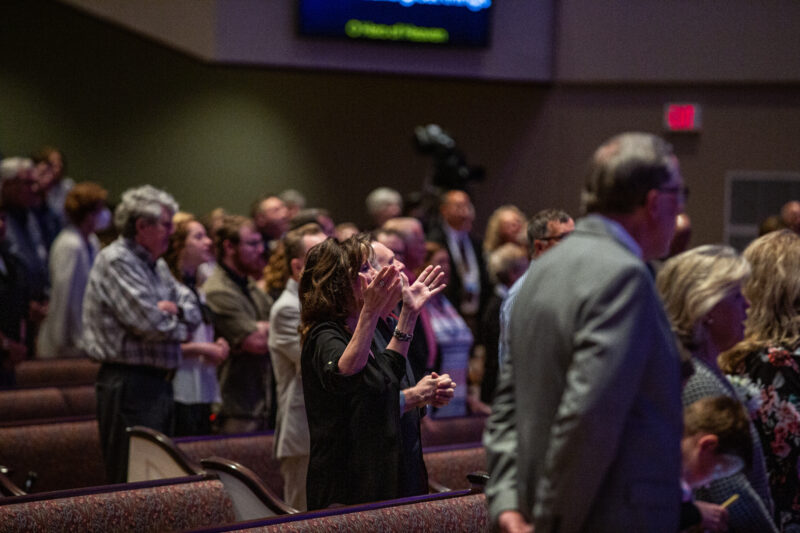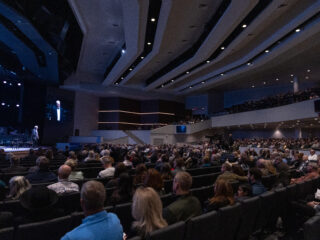After the Sunday morning service several years ago, I was speaking to some members when another member walked up. I could tell he wasn’t happy, and it didn’t take him long to tell me why he wasn’t happy. He didn’t like that morning’s service. In fact, he had a long list of reasons why the service had failed to meet his expectations. Let me share a few of his reasons with you.
First, I hadn’t worn a tie. He thought this was beneath my office and was disrespectful to the service. (It was summer, and we had been hovering in the low 90’s for about two weeks).
Second, I had read a different translation of the Bible. Because I had chosen to read a different translation to emphasize a particular word in the passage, he couldn’t follow along in his Bible.
Third, the music. Of course, the music! He didn’t know any of the songs and why did we have to keep singing the same verse over and over?
When you’ve been in the ministry as long as I have, you get used to these kinds of comments. Most of the time, they just roll off my back. I usually reply politely and explain why we did what we did that morning and tell them to come back next Sunday. We’ll do something different, and maybe they’ll like that.
But there’s one phrase that will set me off. That phrase? “I didn’t get anything out of the worship service.” Say that and I’m going to have to say something. What will I say? Probably something like this:
“Show me where it’s written down where you GET something every time you show up for worship? I can show you lots of Biblical passages that tell us we’re supposed to GIVE something at worship. So, why don’t we talk about what you gave this morning?”
Congregations forget God the Father is the audience of worship. They forget worship is something they bring to God, not something the worship leaders bring to them. Most people show up tired and empty, expecting the worship staff to bring God to them with the spell-casting magic of a Las Vegas floor show.
That’s not worship. It may be entertaining, but it isn’t worship.
Worship is when we, the recipients of God’s grace and love, respond to Him. God, in Christ, offers His whole Self to us and, in worship, we respond the only way we can – by offering our whole selves to Him.
We offer our time. We offer our talents. We offer our resources – and by the way, the standard of giving in the New Testament is the cross, not ten percent. We offer our total selves to God to use however He would need us in His kingdom’s work. Worship isn’t that one hour on Sunday morning when we all sit in our pews and stare at whoever is behind the pulpit.
Worship is our entire lives.
Worship is the God-ward focus of our living, and our corporate worship (Sunday morning) works best when the people of God come together to celebrate what God has done in their lives this past week. And, from that, we anticipate what He will do in the coming week.
But for most of our congregation, they haven’t seen God do anything in their lives and aren’t really expecting God to do anything in the coming week. They come to a scheduled worship service without any expectation of anything changing. They haven’t seen God work in the past. How can they recognize His presence now?
Worship, then, must be brought to them.
It just never works. You can’t worship if the only time you think about God is one hour on Sunday morning. God can’t be an afterthought, a some-time thought that crosses our minds from time to time. Our God is a consuming fire, the source of all being. He is all-loving, all-powerful, all-knowing – All in all, and there’s nothing without Him.
Our worship is proclaimed in our every action. We love our spouses to honor God. We teach our children to His glory. We reach out to our friends because God has made us His friend. We serve those around us who are in need because God always gives us enough to share and, in sharing, someone else will praise God.
We forget the reason we get together is worship. True worship can’t be done alone. It’s too big for just one person. We come together because I need my brothers and sisters to praise God with me. My one voice isn’t big enough, strong enough, to carry all my praise to God. On other days, I hurt so bad I need someone to sing to God for me. I need someone to pray for me because my words are too small to carry the pain I have into the presence of God.
So, Sunday, I’ll walk into the worship service with my own lists. I’ll have at least three of them. I’ll have one list of the things I’m grateful for that week. I’ve learned to keep this list to three or four things. If the list gets too long, it loses focus. The second list will be of those things I’m burdened for. Again, two or three things are enough. The last list contains the names of the people I’m praying for. That list is always too long, but I try to focus on a handful of names during that morning’s worship service.
I’ll come looking for some structure for my worship, and I’ll find it in the liturgy of the morning. They’ll be times for me to pray, to sing, to listen, and yes, to give.
In that moment, I’ll experience all of God I can stand and respond the only way I know how – by giving back all of me.









